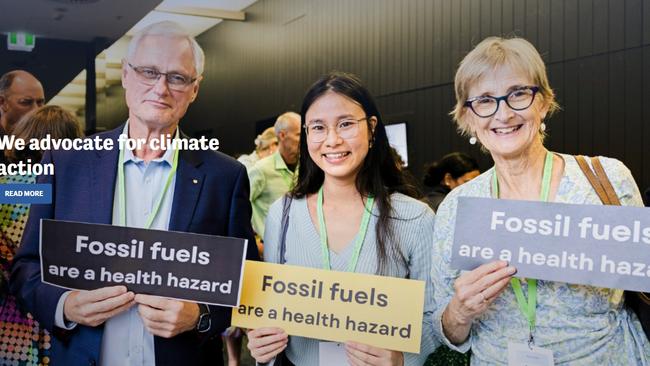
The statement links to a page that encourages people to email a form letter to their local MP that ends with the demand: “To protect the health of the Australian people I call on you as my elected representative to ban all new coal, oil and gas projects.”
Reading too much of this sort of stuff may drive you to reach for a Panadol. The doctors among you will know that its active ingredient is acetaminophen, which is made from coal tar. The Smithsonian Magazine describes coal tar as “a viscous liquid produced when oxygen-deprived coal is subjected to high heat”.
That is the tip of a very large iceberg on which the doctors’ condemnation of coal, oil and gas founders because almost nothing in modern medicine would be possible without fossil fuels. And medicine saves a lot of lives.
A paper in the American Journal of Public Health notes “nearly 99 per cent of pharmaceutical feedstocks and reagents are derived from petrochemicals”. Then come plastics, which “are central to the antiseptic model of modern healthcare and are used in a wide range of medical devices, supplies and packaging. Most plastics are derived from petroleum.”
This part of the story was picked up by a Science Notes article in 2018. “Doctors and nurses wash their hands (a lot) using petroleum-based detergents,” it says. “Even hand sanitiser contains petrochemicals, in the form of carbomer polymers and glycerin. Disposable gloves are made of latex, vinyl and nitrile – all petrochemicals. Disposable syringes, bags that hold blood and saline, and tubing are all made of plastic. Disposable masks, intended to reduce infection of both patients and medical personnel, often consist of synthetic polymers.”
The fossil-fuel-saves-lives defence runs deeper still because gas is an essential element in food production. The Haber-Bosch process won its inventors two Nobel prizes in the first quarter of the 20th century as one German scientist discovered and another scaled up the method for mixing nitrogen from the air with hydrogen from methane to make ammonia for fertiliser. It is estimated that half of the world’s population would not be alive today if not for that breakthrough.
Go organic, the environmental doctors cry. Well, in 2022 Sri Lanka conducted a real-world experiment on that, banning chemical fertilisers in favour of organic farming. There followed the decimation of tea and rice crops, food shortages, soaring prices, riots, the resignation of the prime minister, a presidential apology and abandonment of the fertiliser ban.
Let’s step this out a little further while keeping in mind that electricity is not a fuel source but an energy delivery van.
The International Energy Agency estimated “fossil fuels accounted for more than 81 per cent of electricity production in 2019”.
In Australia, the Department of Climate Change and Energy records that “fossil fuel contributed 65 per cent of total electricity generation in 2023”.
How many people would die if we shut down all fossil fuel power generation tomorrow?
It is argued that carbon emissions from fossil fuels are driving extreme heat and weather events that kill people. As has been noted here before, many of those claims are not supported by the evidence published by the Intergovernmental Panel on Climate Change.
But, given facts do not drive this debate, let’s make a few points on this argument.
First, the world has always had extreme weather events that killed people, so fossil fuel cannot be blamed for every death. Second, many of those killed by heatwaves are the frail aged who have had their lives extended well beyond their usual measure by petrochemical-based medicine. Third, many more people die from extreme cold. Last, how many more would die in even the normal turns of summer and winter if they could not heat or cool their homes?
When we sum the deaths the environmental doctors attribute to rising temperatures – and include whatever other contraindications for using fossil fuel they may like to nominate – the scales fall heavily towards the continued prescription of oil, coal and gas.
That is what will actually happen in the real world because even the uncountable ranks of enthusiasts and activists will continue to lead lives that are entirely dependent on fossil fuel while they condemn it. The protest signs they paint, the bikes they ride to demonstrations, the clothes they wear, the food they eat, the drums they beat and the whistles they blow – all are made by, contain or are transported by fossil fuel. But the activists don’t see it and none has any idea what decarbonising the globe actually means.
The modern world was built by fossil fuel. Removing it from electricity generation is proving desperately difficult. The – already impossible – plan to have 82 per cent of generation sourced from wind and solar by 2030 simply doesn’t work without the life support system of gas. And we don’t have enough gas to make it work because energy-illiterate ministers in the NSW and Victorian governments effectively banned its production.
So those who claim to care about the environment and oppose new gas projects will be responsible for ensuring the plan for more renewable energy fails.
If we solve the problem of decarbonising electricity it will be at enormous expense and will be just the base camp of the road to net zero. Then we will have to deal with the other 80 per cent of the equation: removing fossil fuel from the manufacture of the four pillars of the modern world: steel, plastic, cement and ammonia. That will be unfathomably hard and all the evidence shows it won’t happen.
The International Energy Agency’s review of the world’s stated policies on decarbonising shows fossil fuel demand will fall from 80 per cent in 2019 to 72 per cent by 2040.

How do we get intelligent people to grasp the fierce urgency of now and understand what sustains their lifestyle? Energy consultant Geoff Bongers says one way coal-fired power plants could get their attention is to close one day a week. He calls it Fossil Free Fridays.
Let’s borrow that idea and extend it. Perhaps the members of Doctors for the Environment Australia should start every Friday by skipping breakfast and spending the rest of it trying to do their job, or live their lives, without using anything associated with fossil fuel.
Here they might reflect on an essay by a fellow MD, William C. Roberts, published on the US National Library of Medicine website: “Since nearly all plastics, polymers, inks, paints, fertilisers and pesticides are made from petrochemicals and all products are delivered to market by trucks, trains, ships and (aeroplanes), virtually nothing in our offices or on our bodies is not dependent on fossil fuels,” he wrote.
Doctors can also forget exercising in Lycra (a polymer).
In fact, maybe everyone should sit this I Spy test. Name something in the built environment that does not have fossil fuel embedded in its substance or delivery.
Happily, the US Department of Energy has published a handy list of 6000 everyday products made with “petrochemicals derived from oil and natural gas”.
Early in the alphabet soup of essentials comes antihistamines, antiseptics and artificial limbs. It moves on through bandages, cellphones, clothes and cortisone, takes a personal hygiene turn at deodorant, toothbrushes and toothpaste, and makes a point of adding solar panels.
And right before it plants its full stop at yarn, it lists wind turbine blades.







Illiteracy about how the world actually works is everywhere but is often paraded by some of the nation’s most highly educated people. Take Doctors for the Environment Australia. The group’s website declares “coal, oil and gas are health hazards”.